“The world is a book and those who do not travel read only one page.” — Saint Augustine
The death knell of the local queer bookstore has been heard around the world, with many mourning this cultural loss as store after store has shut down, but as Mark Twain once quipped, “the reports of my death are greatly exaggerated.” Though diminished in number because of big box stores, Amazon, and assimilation into the mainstream, a handful of queer bookstores continue to do what they do best: offer up great gay literature and provide spaces for queer people to meet, mingle, and even crochet. Innovation and reinvention for a new era are hallmarks for these flaming phoenixes, aiming to thrive, not just survive, while maintaining the quirky edge that sets them apart from traditional literary outlets. For LGBTQ travelers, these bookstores are gems for connecting with local queer history, current things to do, and regional writers and artists. You can also put down the Grindr and Scruff for some old school, face-to-face cruising. To satisfy your literary lusts, here’s Passport’s global guide for bookish queer travelers.
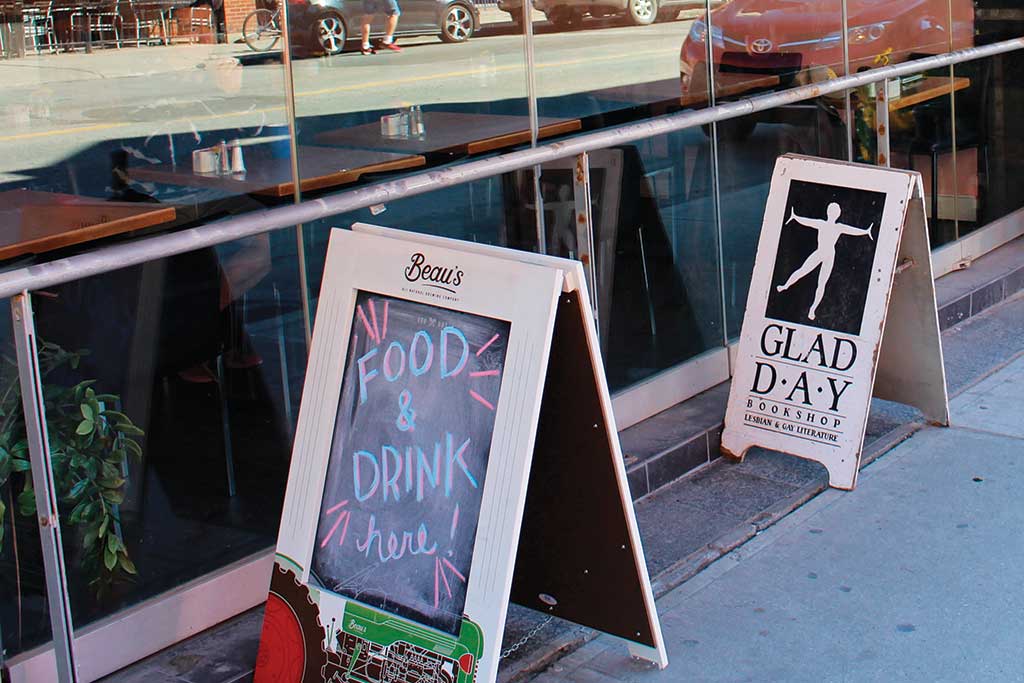
Glad Day
GLAD DAY (TORONTO, CANADA)
“Glad Day started in a backpack that [activist] Jearld Moldenhauer would take to meetings,” says Michael Erickson current Glad Day lead owner. The store’s gone through many incarnations and locations, including Moldenhauer’s apartment (sharing space with Canada’s groundbreaking Body Politic magazine), and, later, a backyard shed. For more than three decades, its best known address was the second floor of a three-story brick walkup, located on a once seedy main strip in downtown Toronto. It had a sense of grit, with a bin of used porn magazines, closely spaced shelves, and a wall of erotic male photography books.
It became the oldest surviving LGBTQ bookstore in the world after New York City’s Oscar Wilde Bookshop shut down in 2009. Glad Day has its own financial challenges, but the current owners keep thinking bigger, not smaller. In 2015, they launched the Naked Heart Literary Festival, now entering its third year. With about 1,700 attendees and almost 100 authors, it’s the largest LGBTQ book festival in the world.
Another bold decision bore fruit late last year. Under the guidance of Erickson and Manager Scott Dagostino, Glad Day not only moved to the heart of Toronto’s gay village, at Church and Wellesley Streets, it reinvented itself. It took over a recently closed 1500-square-foot restaurant/bar at street level with floor-to-ceiling windows and a back patio that seats 18. Rent is “way higher,” but it’s a gamble that Erickson is confident will pay off, and “The Village,” with its rainbow street signs and artwork, now has a queer bookstore to call its own. With an accordion glass front facade that’s kept open in the summer, some have called it “Church Street’s living room.”
They kept the bar; it’s now studded with taps serving beer by Ontario-based, independent craft brewers, as well as coffee that is fair-trade and organic, supplied by Propeller, a local Toronto roaster. Stretching the length of the store, behind the bar, is a new tile wall with pink grout. “It’s very current and very 70s at the same time,” says Erickson. “It’s a throwback and a throw forward.”
Glad Day’s also fired up the kitchen, serving mostly North American comfort food, including mac and cheese in “sushi form,” and they cater to vegans, gluten-free diets, and meat lovers alike. Erickson says brunch gets packed by 1 P.M., and is “pretty cheap” for the Village.
Clearly, it’s not the same Glad Day, and yet they’ve managed to maintain their grassroots feel. “We’re not Starbucks, we’re not Chapters,” says Erickson. “We’re not pretending to be sanitized. We’re kind of fun, we’re kind of dirty, we’re high quality and independent. We’re real people doing real things…I’ve watched a lot of first dates at Glad Day where one person tells the other person the history of Glad Day and that melts my heart every time.”
Amid all this, the books are not forgotten, but there is a coyness to the way they are situated, with eating tables drifting out of the main eating area, to sit among-st the bookshelves, like tundra transitioning into forest. “You can sit among the books, and eat and read.”
Many of the shelves are on wheels, so they can be shifted about for different special events. There’s “tipsy knitting,” (bring your own knitting or crafts), a gay gamers board game night (pop-star Carly Rae Jepsen once attended—“no big deal”), children’s readings with drag queens, book launches, and a monthly rotation of parties, ranging from their “Bear Bash” to pop or R&B.
“We’re basically open 18 hours a day because of the dance parties. We’re a full service establishment. It’s the only way we can make the high cost of rent.”
It’s also means a flip for how Glad Day integrates into, and contributes to, Toronto’s LGBTQ scene. The previous space attracted “bookish, nerdy people into poetry and queer theory.” The new demographic is a lot more diverse, and not necessarily there to read.
“In the old location, people came for the books and built a community. In the new location, people are coming for the community and then buying books.” For events, check their Facebook page: www.facebook.com/gladday. 499 Church St, Toronto, Ontario, Canada. Tel: +1-416-961-4161. www.gladdaybookshop.com
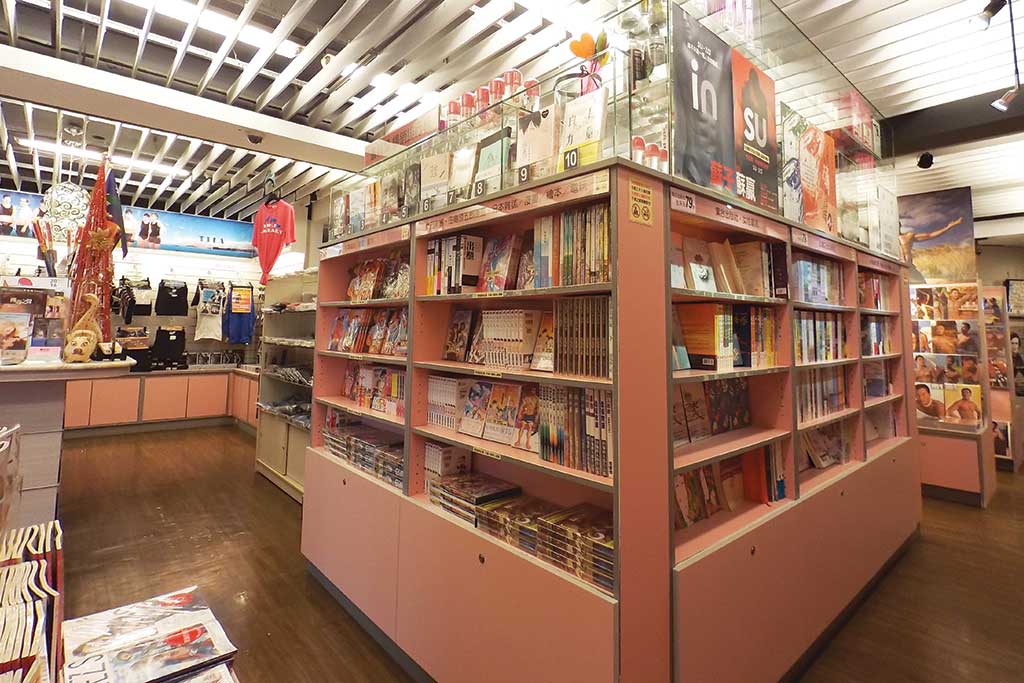
Gingin Books
GINGIN BOOKS (TAIPEI, TAIWAN)
“We are proud of being the first LGBTQ store in Taiwan,” says GinGin James of LGBTQ bookstore, GinGin. The front yard’s concrete wall and brick pillars that visitors pass through would normally have a stark, brutalistic vibe, but the façade is softened by a coy rainbow flag, pink butterfly lanterns, a beautiful wooden front patio with ferns, and a carefully designed pink sign, whose message goes beyond the printed word. The color is an homage to the suffering of LGBTQ people during the Second World War (“We want people to remember the tragic history and to not let it happen again”) and the Chinese font is “traditional and simplified.” If James were to sum up the aesthetic, he’d use the word “pure.” Tourists can judge for themselves as they pass the image of a shirtless hunk in an underwear ad.
GinGin opened 19 years ago, on January 1, 1999, at a time when he says the only gay venues in the country were bars. Located in an art district, known for its three universities, two commercial zones, and for being a cultural center in Taipei, GinGin has become a cultural destination itself.
In particular, GinGin wants to support “any kind of artist,” from writers to photographers, “especially the independent ones.” That includes art exhibits, including a series of playful cartoons. It’s clearly working. He’s been contacted by Taiwan’s Ministry of Foreign Affairs and Ministry of Culture, and the store’s also attracting visitors from all over the world, including Vietnam, Macao, Russia, Canada, and Chile.
Innovation and reinvention for a new era are hallmarks for these flaming phoenixes, aiming to thrive, not just survive, while maintaining the quirky edge that sets them apart from traditional literary outlets.
“Even [though] my English is basic, I believe that is not a problem.” Language barriers are forgotten when visitors meander through the store’s aisles of books, art exhibits, and tank tops, where they can “feel warm, love, comfort, confidence, and pride.” That includes “tomboy lesbians from Europe and USA.” They “love to [try] the breast binders.” 100, Taiwan, Taipei City, Zhongzheng District, Alley 8, Lane 210, Section 3, Luosifu Road, 8. Tel: +886-2-2364-2006. www.ginginbooks.com
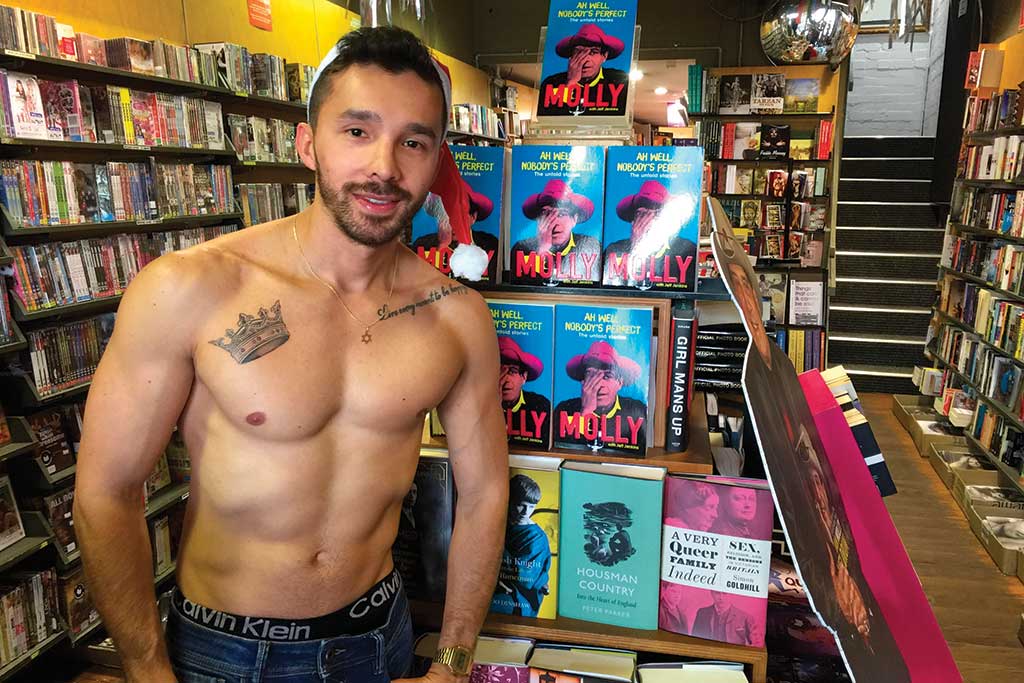
The Bookshop Darlinghurst
THE BOOKSHOP DARLINGHURST (DARLINGHURST, AUSTRALIA)
Muscled model boys lined up outside the store and celebrity book signings are some of the showier events that The Bookshop Darlinghurst has hosted over the years. The latter includes authors like Armistead Maupin, Edmund White, and Patrick Gale. “In February, we had a famous Australian lesbian DJ playing a set outside the shop for a pre-mardi gras event,” says manager Graeme Aitken. The shirtless models were part of a photographer’s book signing and they had a Sexy Santa on hand for a Christmas shopping event. “We get a lot of compliments on our friendly staff,” says Aitken.
The store is long and narrow, its beautiful hardwood floors contributing to a bowling-alley feel with displays in the middle. It’s nestled among-st a strip of other shops on Oxford St., Darlinghurst, “which was once ‘the Golden Mile of gay Sydney.’” These days, he admits, “the area is not doing well…and there are large numbers of vacant businesses.” Some popular shops and businesses have closed, such as an art-house cinema and a gay gift shop, and the street is becoming “overrun” by 7/11 convenience stores and Asian massage parlors, but he’s optimistic that with some polish the Golden Mile can glitter once again.
“In the past 12 months, there has been some improvement, with new businesses opening, especially in our block. The state of the famous gay street was even an issue in the recent city council elections.”
He adds: “Americans are usually impressed that we exist at all and tell us that their bookshops closed down years ago.” Like most tourists, “they tend to be interested in Australian books and DVDs that they can’t find at home.”
He tells me: “Our range of books is also very comprehensive and [our] overseas visitors…tell us we have the best range of any gay bookshop in the world. For instance we always have your book Gay and Single…Forever? on the shelf ?”
Like many gay bookstores, The Bookshop Darlinghurst was an important part of the coming out process for many older customers, back “when GLBTI wasn’t as ubiquitous as it is today and finding GLBTI books was very difficult. But the occasional gay man has definitely found a sexual partner in our shop as well, when erotic gay magazines used to be published and we stocked them. Our magazine section tended to be cruisy at times! But there has also been romance, and one of our own staff met his partner here, and they have now been together for almost a decade.” 207 Oxford St, Darlinghurst, Australia. Tel: +61-2-9331-1103. www.thebookshop.com.au
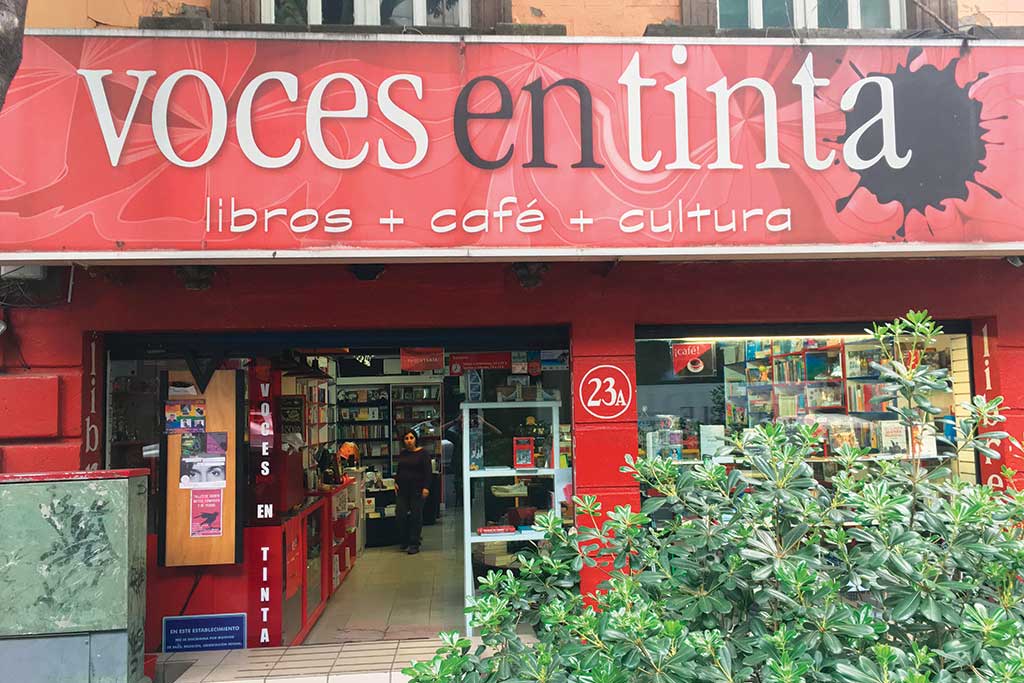
Voces en Tinta
VOCES EN TINTA (MEXICO CITY, MEXICO)
A giant blot of green ink splashes the sign for Mexico’s LGBTQ bookstore, Voces en Tinta (Voices in Ink); it promises “libros + café + cultura.” The utilitarian concrete exterior is livened with crimson paint, and a rainbow flag is draped over a display table. Like many queer bookstores, Voces en Tinta steers clear of trendy, overly designed, ultra-modern, or curated-bohemian aesthetics. Its floors are plain off-white tile warmed by a wall hanging of five women dancing naked before a purple sky.
“In the bookstore,” says Rebeca Rios, who handles PR, “we believe that one of the most important feelings that any space should make you feel, especially a place like ours, is warmth.”
The store’s located in the city’s gay-friendly Zona Rosa. She tells me there are many theories how the Pink Zone got its name, but my favorite comes from the Mexican writer Vicente Leñero, who said: “This zone is too shy to be red but too bold to be white.”
Rios explains that the stores founder, Bertha de la Maza, worked for financial institutions and non profits as an agronomist engineer. She often traveled to Spain where she’d buy queer-themed books to bring home to Mexico. She lent them “constantly” to friends and family.
That inspired her to open Voces en Tinta in 2009, the same year that Washington D.C.’s Lambda Rising queer bookstore announced it would be closing.
“The insistence and constant petitions of her friends made her think of the possibility of opening a bookstore that brought sexual diversity themed books to Mexico,” Rios explains. “Although there were some big bookstores that welcomed the idea of selling this category of books, others rejected the idea because of prejudice. A bookstore even said those books were: “literatura para putos” (a really demeaning term that is commonly used in Mexico for the gay community).”
In a city of almost 9 million, Voces en Tinta has filled a niche, not only connecting queer readers with books that speak to them, but providing a space to connect in person as well. Bertha de la Maza now devotes herself full time to the store’s publishing wing, which distributes solely through the bookstore. “Entrepreneur” Alberto Robles Garcia runs the store and café, which serves coffee, tea, and “little bites” such as cuernitos y chapatas (like a sandwich), molletes (a slice of bread covered in beans, cheese, and bacon), burritos, cookies, and cakes.
Rios says the 1,300-square-foot store is a second home for some and a “safe-house” for others, from the Texan who said, “I love this place. I wish I could take it with me,” to the trans woman who asked the staff to teach her how to put on earrings.
Voces en Tinta features local artists, board game nights, workshops, and talks by local influential personalities. “We are a big, compassionate heart that beats for the voices of the minorities that weren’t heard before.” Niza 23, Juárez, 06600 Cuauhtémoc, CDMX, Mexico +52-55-5533-7116. www.vocesentinta.com
PHILLY AIDS THRIFT @ GIOVANNI’S ROOM (PHILADELPHIA, USA)
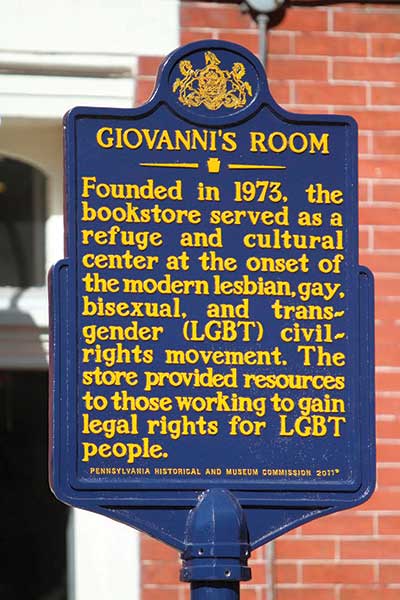
Giovanni’s Room
In 2014, there was a slew of media stories concerning the end of Philadelphia’s queer bookstore, Giovanni’s Room. Established in 1973, it was set to be another casualty of the rise of big-box stores and online shopping. And yet, they’re still here, rebranded as Philly AIDS Thrift @ Giovanni’s Room, the oldest and “best” lesbian and gay bookstore in the country.
When they were about to permanently close their doors, “a local Philadelphia-based non-profit (Philly AIDS Thrift) stepped in to take over the business,” says Manager Alan Chelak. “Today we continue to carry new LGBT books, but have also integrated a non-profit thrift store model into the business so that the store can become profitable again.” They accept donations of lightly used books, CDs, DVDs, and records, and then resell them. At the end of the month we donate our proceeds to local HIV/AIDS organizations…we are well into our third year of this model, and I’m happy to report that the store is turning a profit and has become sustainable once again.”
The store feels historical, located in two brick buildings; one is from the 1920s, another is a “mom-and-pop store and house from the 1880s.” Out front is a prominent sign, which says “the store provided resources to those working to gain legal rights for LBGT people.”
“It was important to all of us to continue the legacy of Giovanni’s Room,” says Chelak, and he says there’s a sense of “shared history like the Stonewall Inn.” Their website positions them as the “traditional” place to start any LGBTQ visit to Philadelphia, comfortably located in the middle of Center City, with maps, guides, and free advice. “If you can get a staff member of the store to kiss you, then you will be in the direct succession of Walt Whitman’s kiss, which flows from Walt to Edward Carpenter to E.M. Forster to Allen Ginsberg to Bern Boyle to one of the founders of Giovanni’s Room.”
Chelak says they’ve also done a lot to “update” the look and feel of the store. “I think anyone who has visited us will agree that it’s a fun place to visit, there’s always amazing, interesting, unique, and sometimes weird stuff to see.” The “weird stuff” can range from mannequins in outlandish used clothes to a mural of the goatish Gruß vom Krampus kidnapping a maid. Most importantly, though, Chelak wants everyone to feel welcome.
“Recently I helped a woman find a book that dealt with LGBT issues from a Christian perspective. She told me she wanted to send it to her mom who hasn’t spoken to her since she came out.” The customer mailed the book to her mom, and a few weeks later Chelak received a letter saying that “the mother read the book and has since reached out to her daughter.” Now, they’re speaking again. “When I think about this story, and how our little store was able to help these two people who love one another reconnect, it makes me feel really proud to be apart of Philly AIDS Thrift.” 345 S. 12th St., Philadelphia, PA. Tel: 215-9232960. www.queerbooks.com
Steven Bereznai is a Toronto-based travel writer and author. His books include the bestselling I Want Superpowers and Gay and Single…Forever? Follow him on Instagram.


